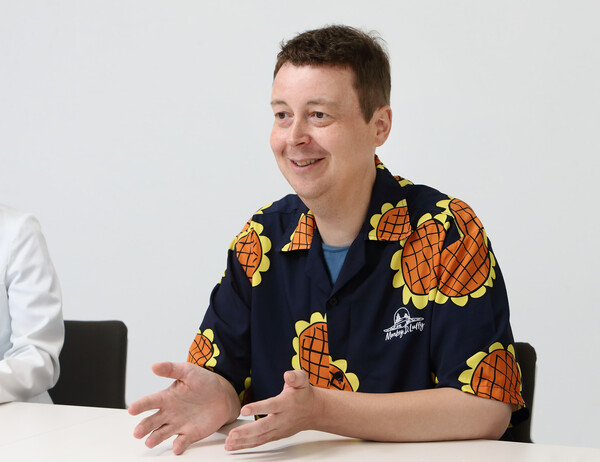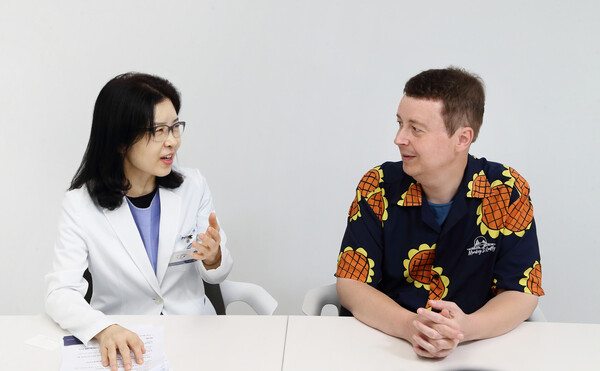“When I visit doctors, they mostly ask me, 'What's wrong? Where does it hurt?' Then, I only talk about what hurts. Especially because I'm a foreigner. When I see a doctor with my wife, she and the doctor talk in Korean. I'm the one who feels the pain, and I know where it hurts, but they talk about it, and the doctor says, 'Do this,' finishing the consultation. However Dr. Lee Ji-hyun always asks, 'How are you feeling?' It's good that she asks me questions first so that I can tell her what's good or what’s uncomfortable. She tends to focus on me more instead of my wife.”
It was in February 2020 that the symptoms of Crohn's disease first occurred in Arthur MacDonald, a Canadian living in Seoul. After eating a meal in Itaewon, he felt sick to his stomach and vomited. After two weeks of constant stomach pain, MacDonald visited a neighborhood clinic. He was prescribed digestive medication, but the pain returned after a period of improvement, and the recovery-recurrence cycle continued for four months.
A CT scan revealed a large lump in the ileum. The doctor immediately suspected Crohn's disease and recommended surgery. However, McDonald was reluctant to undergo surgery, as it had been two weeks since his hospitalization, and his pain was subsiding. He also knew internationally renowned hospitals, including the Mayo Clinic, that recommended surgery only for chronic problems.
McDonald decided against surgery and traveled back to Canada to seek treatment. He has been managing his symptoms with a 16-18-hour intermittent fasting, visiting the doctor only occasionally to be prescribed Pentasa (5-aminosalicylic acid, an anti-inflammatory), Solondo (a steroid), and tramadol (a painkiller) for years.

This past April, however, his Crohn's symptoms became more severe. The trigger was eating chicken after returning to Korea. McDonald, whose abdominal pain became severe again after eating chicken, began to receive treatment from Lee in Seoul Songdo Hospital at the recommendation of the general practitioner at his neighborhood clinic.
On April 23, McDonald first met Lee, head of the Department of Gastroenterology at Seoul Songdo Hospital.
“Mr. McDonald had experienced abdominal pain, fever, and lethargy in his right lower abdomen as a result of repeated episodes of structural inflammation in the terminal ileum and large intestine, where Crohn's disease is commonly seen,” Lee said.
Lee confirmed Crohn's disease based on MacDonald’s past medical history and blood test results. However, she concluded that intermittent medication used only when symptoms recur is not the best way to treat Crohn's disease.
Although steroids are effective, they have side effects when used for a long time, so she felt the need for immunomodulators or biologics that can have a lasting effect. Lee prescribed oral steroids for a short period in the early stages of treatment, followed by the immunomodulator azathioprine.
However, continuing the existing treatments for Crohn's disease was difficult for McDonald. He had a fear of immunomodulatory side effects and a phobia of injections. A medication came to Lee’s mind, then – Rinvoq, the only oral JAK inhibitor available for Crohn's disease.
In clinical trials in patients with moderate-to-severe inflammatory bowel disease (ulcerative colitis and Crohn's disease), Rinvoq demonstrated rapid and significant improvements in clinical remission, endoscopic remission, and mucosal healing compared to placebo in induction and maintenance therapy.

“It wasn't the first thing I thought of, but during treatment, I realized that an oral formulation would be much more accessible because the patient had a severe phobia of injections,” Lee said. “When I first told him about the drug, he was afraid of the side effects and rejected it, but at the next appointment, I looked up a lot of information about it, and he agreed to give it a try because it has fewer side effects and is effective overseas. Crohn's is a chronic disease, and patient adherence to treatment is an important factor that can make or break a treatment.”
Better still, Rinvoq has been covered by health insurance since April, which helped ease the burden on patients.
Rinvoq is a selective JAK1 inhibitor indicated for patients with moderate to severe ulcerative colitis who have not had an adequate response to, or are intolerant of, universal therapies, including corticosteroids, 6-mercaptopurine, or azathioprine, or for whom these agents are contraindicated. It is also indicated for patients with moderate to severe ulcerative colitis who have not responded to, or are intolerant of, universal therapy (two or more agents such as corticosteroids or immunosuppressive agents), as well as for patients with moderate to severe active Crohn's disease (CDAI of 220 or greater) for whom therapy is contraindicated.
Rinvoq showed effectiveness more than expected.
“After taking Rinvoq, I felt like I returned to how I was before I developed Crohn's disease,” McDonald said. “Before, I could barely do my daily activities because even a short walk was painful. However, I can now walk for two to three hours straight, and after a short break, I can continue my daily activities.”
“The patient showed a good clinical response from the second week of Rinvoq,” Lee said. “On June 11, his C-reactive protein (CRP) inflammation level, with a normal range of about 0.5-1.0 mg/dL, was 14.78, which was very high. On July 23, it dropped to 3.82 but was still not in the normal range. However, on Aug. 6, after two weeks of Rinvoq, it was 0.86, which is within the normal range, and he has not shown any signs of side effects.”

Lee further shared her experience with prescribing Rinvoq.
“Crohn's disease can cause inflammation beyond the mucous membrane and deep into the intestinal membrane, leading to many complications, including intestinal abscesses and surgery. Therefore, healing the mucosa and stopping the inflammation before structural changes occur is desirable,” she said. “In this regard, Crohn's disease requires intense treatment with targeted therapies from the beginning. I think insurance standards may need to change in the future.”
Lee stressed that patients shouldn't stop medication arbitrarily just because they have a good prognosis.
“There are cases of people who are on targeted therapies, and their prognosis is so good that they (arbitrarily) stop taking their medication, and they often get worse again in a short period,” she said. “It's crucial to stay on treatment because once you get worse, it's not easy to return to where you were.”
“Although Crohn's is a challenging disease, there are many good solutions and support available,” she said. “And it's essential to keep your doctor informed and communicate with them about your progress.”
Finally, Lee emphasized the importance of getting enough rest and good nutrition to maintain a healthy lifestyle.
“During the active phase (when inflammation is high), you need to get plenty of rest because it's very fatiguing and exhausting, and you need to work with them on how to eat nutritious foods because, in the beginning, they may not have an appetite and it can be difficult to eat,” Lee said.
She continued, “For patients who are feeling better and returning to their normal routine, especially those with small bowel Crohn's, diet is important. There may be issues with the small intestine that tests can't detect, so avoiding fatty, instant, spicy, or chewy foods and eating quickly can be problematic. Sleep is also very important, so ensuring you're getting enough rest is important.”
Related articles
- European Commission expands treatment use for Remsima SC to cover Crohn's disease and ulcerative colitis
- ‘Youngsters with recurrent abdominal pain, diarrhea, and IBS should suspect Crohn's disease’
- Health insurance coverage expanded for Rinvoq to treat ulcerative colitis, Crohn's disease in Korea
- AbbVie's Skyrizi expands indications to Crohn's disease
- New surgical method reduces complications in recurring Crohn's disease
- Expanded reimbursement for Rinvoq enhances atopic dermatitis treatment options
- Parents outraged as government cuts special dietary support for pediatric Crohn’s patients
- Korean researchers lead Asia's largest study on pediatric inflammatory bowel disease
- AbbVie’s Rinvoq expands reimbursement in Korea for psoriatic arthritis
- Researchers map gut bacteria and human genes to understand Crohn’s disease

